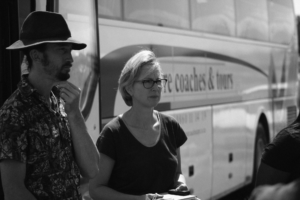
Florian Kroll and Dr Camilla Adelle during a Food Governance CoP field trip.
The “Local food governance” project involves Dr Camilla Adelle (UP) and Florian Kroll (UWC).
During 2017–19 a series of ‘knowledge brokerage platforms’ (communities of practice (CoPs)) were set up. These platforms bring together government officials, practitioners, academics, and other stakeholders in the food system with academic researchers associated with the CoE-FS in an iterative process through which policy problems are discussed, existing research shared, research gaps identified and new knowledge created integrating multiple perspectives. The knowledge brokerage platforms, originally developed as pilots in 2017–18, focused on local food governance in the Western Cape and then in Gauteng. In parallel, activities were conducted at the municipal level with the support of SALGA, a Schedule 3A public entity in terms of the Public Finance Management Act (1999) that is an autonomous association of all 257 South African local governments.
The objectives of this project in 2022 were to:
- Identify transferable actions that strengthen a local governance approach for food security
- Deepen the existing platforms as these take time to mature and become sustainable, and to explore how to roll out further platforms to other provinces and regions
- Study and better understand the process of knowledge brokerage and the co-production of knowledge for food governance, identifying reasons for success and failure
- The project adopts an action research approach, engaging directly with the transformation of governance practice by generating knowledge to inform practice. To do so, and considering multiple perspectives, the study employs a mixed method approach, combining quantitative and qualitative instruments, as well as frequentist and Bayesian inference approaches to model development.
In 2022, the CoPs in Gauteng and Western Cape merged and were rebranded as the Food Imbizo. The new name reflects the reality of what the gathering of scholars, government representatives and food practitioners has become under COVID-19: an influential network that has supported the rising of other communities from within its fold. The meetings have continued to meet online with six main meetings in 2022 (and a few spin-off workshops) each reaching on around 50 to 70 participants from across the country. In collaboration with SAFCEI, the Food Imbizo developed policy briefs and conducted online workshops specifically highlighting the role of faith communities in food governance, thereby extending its influence and engagement to a novel domain with potentially powerful reach. Efforts are being made to include speakers and participants from other provinces, such as eThekwini. The rebranding has been accompanied by a new Food Imbizo website all the resources and records derived from the meetings. The Food Imbizo also started to further disseminate the knowledge co-produced in its meetings through articles published in The Conversation Africa. The project also completed publication of two journal articles specifically highlighting the importance of food governance in the urban design, planning, and management contexts, thereby making a significant contribution to the global profile of food issues in this professional domain.
Building on recent literature on transdisciplinary CoPs, which bring together stakeholders from very different disciplines, organisations and backgrounds, our research has reflected on the experiences of our emergent CoP. Our results show the following lessons for managers and participants engaged in establishing similar ‘third spaces’ for knowledge co-production:
- make inevitable power asymmetries explicit
- the identity of the group should not be built on a particular normative position but emerge from discursive processes and,
- create a balance between supporting peripheral learning and maintaining the specialist cutting edge discussions needed for co-production.
Furthermore, the most beneficial legacy of a CoP (or another kind of social learning space) may not be the outputs in terms of the co-produced knowledge but the development of a cohesive group of stakeholders with a new shared way of knowing. This shared way of knowing and reflexivity or ‘meta-learning’ (i.e. learning to learn) is a key governance capability for dealing with complex and ambiguous social problems. In this way, CoPs can foster social learning not only for the co-production of knowledge for solving wicked policy problems but also help transform learning and ways of knowing necessary for the emergence of novel governance arrangements.
Research under this project will continue in 2023.
related Articles
2022 CoE-FS research in review: Maximising access to a balanced, safe and...
The “Maximising access to a balanced, safe and healthy diet for the poorest urban residents” is led by Dr Marc…
2022 CoE-FS research in review: National food governance – Towards national knowledge...
The “National food governance – Towards national knowledge brokerage” project involves Dr Camilla Adele (UP), Florian Kroll (UWC), Professor Lise…
Research at the CoE-FS in 2022
Professor Julian May, co-PI of the CoE-FS’s Programme 1, examining food supplies in the home of Brenda Siko, who runs…



